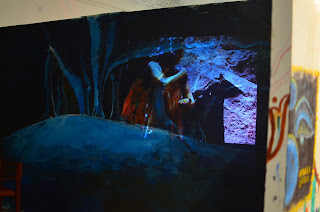in collaboration with Raqs Media Collective
The students of MPhil (Batch - 2015-17), Visual Studies, JNU along
with Raqs Media Collective (Monica Narula, Jeebesh Bagchi &
Shuddhabrata Sengupta) feel honored to invite you to our closing event 'When does the curatorial work end?' on the 8th of April, at School of Arts and Aesthetics Gallery, Jawaharlal Nehru University.
This event is a culmination of a series of class discussions
between Raqs Media Collective and the students, between students and
the artist community in Delhi and between the student community within
JNU and outside of it.
What
started as a workshop conducted by Maya Kovskaya in October 2015, on
'curating' has brought us to engage with questions of the 'curatorial'
with Raqs Media Collective.
At the
onset, it is necessary to distinguish between the curatorial and curating.
Curating, as a mode of practice and curatorial, as a mode of thinking. To quote
Irit Rogoff, “If
‘curating’ is a gamut of professional practices that had to do with setting up
exhibitions and other modes of display, then ‘the curatorial’ operates at a
very different level: it explores all that takes place on the stage set-up,
both intentionally an unintentionally, by the curator and views it as an event
of knowledge. So to drive home a distinction between ‘curating’ and ‘the
curatorial’ means to emphasize a shift from the staging of the event to the
actual event itself: its enactment, dramatization and performance. ‘Curating’
takes place in a promise; it produces a moment of promise, of redemption to
come. By contrast, ‘the curatorial’ is what disturbs this process; it breaks up
this stage, yet produces a narrative which comes into being in the very moment
in which an utterance takes place, in that moment in which the event
communicates and says, as Mieke Bal once observed, ‘look, that is how this is’."
We have come to realize a question that is central to this disposition, when does the curatorial begin/end?
As a thought in progress, this has taken us in many directions, to
broaden the ambit of arts itself, to create necessary tension and
stretch our zones of comfort,both intellectual and experiential, as well
as within the modalities of practice.
We
invite you to become a part of this event which will only enrich our
engagement with arts - politically, socially, inherent both in the extra
ordinary and the quotidian.
We'd
like to take this opportunity to thank Raqs Media Collective, Maya
Kovskaya, Inlaks Shivdasani Foundation,our faculty members, the student
and artist community and all those who have been a part of this
engagement.
Text written by Parul Singh










































No comments:
Post a Comment